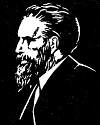|
A Radio Talk by Charles F. Kettering  In November 1895, Professor W. Röntgen of the physics department
at the
University of Würsburg was experimenting with the flow of
electricity
through rarified air. He could detect the presence of free electrons by
holding a fluorescent screen near the vacuum tube. On this particular
day he had covered the tube with black paper and was studying the
screen near the tube when he noticed that some small crystals quite a
distance from the table were glowing.
In November 1895, Professor W. Röntgen of the physics department
at the
University of Würsburg was experimenting with the flow of
electricity
through rarified air. He could detect the presence of free electrons by
holding a fluorescent screen near the vacuum tube. On this particular
day he had covered the tube with black paper and was studying the
screen near the tube when he noticed that some small crystals quite a
distance from the table were glowing. At first he thought that some stray electrons might be causing this, but he placed the crystals beyond the known range of such effects but they continued to glow. At the time Röntgen wrote to a friend, "I have discovered something interesting but I don't know if my observations are correct." But he was convinced that he had uncovered something amazing when he tried some more experiments. He placed a book and sheets of metal between the tube and his screen. The new rays easily passed through them. The only metals that stopped the rays were platinum and lead. Because he knew so little about this mysterious light, Röntgen gave it the name X-ray. |








